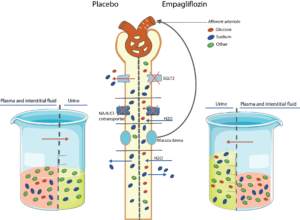Publication: Effects of Empagliflozin on Renal Sodium and Glucose Handling in Patients with Acute Heart Failure
In a study by Eva Boorsma and colleagues (including Joost Beusekamp, Jozine ter Maaten, Sylwia Figarska, Dirk Jan van Veldhuisen, Peter van der Meer, Kevin Damman, and Adriaan Voors from UMCG Cardiology) that was published in the European Journal of Heart Failure, they showed that empagliflozin in patients with acute heart failure (HF) increases fractional glucose excretion and plasma osmolality, without affecting fractional sodium excretion or urine osmolality and causes a temporary decline in eGFR.
In chronic HF, the beneficial effects of sodium glucose cotransporters-2 (SGLT2) inhibitors on HF outcomes have been attributed to cardiometabolic and renal protective qualities, as well as to its diuretic properties. In acute HF, we recently showed that early addition of empagliflozin to standard diuretic treatment increased cumulative diuresis after 4 days with a possible reduction in HF related events. The present mechanistic study identified the effects of empagliflozin on renal sodium and glucose handling in patients with acute HF. We found that patients with acute HF receiving empagliflozin had a higher urinary output and a more negative fluid balance. Interestingly, fractional sodium excretion did not increase and urinary osmolality remained similar between both groups. Nonetheless, fractional glucose excretion significantly increased after initiation of empagliflozin. Moreover, empagliflozin temporarily reduced renal function in the first days after hospital admission which recovered after 96 hours.

Funding
EMPA-response-AHF was funded by Boehringer Ingelheim through an investigator-initiated study grant.